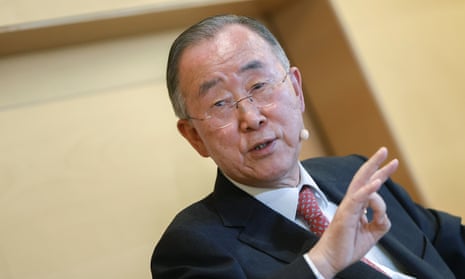The former UN secretary general Ban Ki-moon has warned that the world’s largest fund to help developing nations weather the climate crisis remains an “empty shell”, despite decades of promises by rich nations.
“We need to see a massive acceleration in mobilising trillions of dollars needed to keep the world from climate collapse,” he said.
International climate finance from rich to poor countries is between five and 10 times short of what is needed, according to the UN. In 2020, money set aside to help poorer countries adapt to climate breakdown amounted to $29bn – far below the $340bn a year that could be needed by 2030.
The largest such fund, the Green Climate Fund, stands at $11.4bn. Rich countries have also been accused by NGOs of misleading accounting and issuing loans instead of grants.
Ban, a South Korean diplomat, served from 2007 to 2016 as eighth UN secretary general; his first major initiative was to urge action on climate at the Bali summit in 2007.
Two years later, at Cop15 in Copenhagen, rich countries promised to provide $100bn of climate finance a year every year for developing countries by 2020. However, Ban said: “After 14 years, nothing has been happening.”
The war in Ukraine, as well as conflicts in Tigray, Ethiopia, Yemen and Afghanistan, have taken the focus away from the climate crisis, he added. “The most critical crisis is climate change, which is happening so much faster than one might think. We have no time to lose.”
Ban did not agree with critics who saw Cop27, held in Egypt last year, as a failure. “We were able, after decades, to agree on loss and damage. That was a great success,” he said.
But it was now the “moral responsibility” of states to put talk into action, he added, to help poorer countries adapt to global heating, and to mitigate the loss and damage they have already suffered from the climate crisis. “I have been urging political leaders: raise your political ambition levels and then find a way to provide the financial support. It is their moral responsibility.
“As we move towards Cop28 in the United Arab Emirates, our efforts in climate mitigation and adaptation must accelerate.”
Known for his quiet diplomacy during his time as secretary general, Ban went on to co-found the Ban Ki-moon Centre for Global Citizens in 2017, to empower women and young people to achieve climate and development goals. Stepping down from his UN role, he said, meant he could now talk more forcefully about the climate emergency – for instance, when in 2020 he described Donald Trump’s withdrawal from the Paris agreement as “morally irresponsible”.
“Many people regard me as a gentle and soft person,” Ban said. “But when it comes to climate I become much more passionate and sometimes angry. I refrained from expressing my anger as secretary general. But now I am a retired person. I was really angry at Trump, when he was president, withdrawing from the Paris climate change agreement.”
Trump’s withdrawal was politically shortsighted, scientifically wrong and morally irresponsible, he said.
Ban, 78, also chairs the Global Center on Adaptation and is an advocate for smallholder farmers, who in sub-Saharan Africa and parts of Asia produce 80% of the food but receive only 1.7% of climate finance. “This is irrational,” he said.
“What an injustice. If we want a world free of hunger while adapting to climate change, we need to put smallholder farmers at its centre.”
